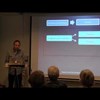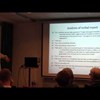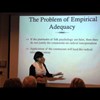ming
Political Philosophy Mini-Workshop
This is an open event with pre-circulated papers, including a presentation of the first paper but not the second. See abstracts below. Schedule 13.15 Coffee 13.30 “Legitimate Authority and Social OntologAuthor: Laura Valentini, LSECommentator: Aaron Maltais, Stockholm University
The Implicit Mind
Philosophical and Psychological Perspectives on Implicit Cognition. Workshop on the 25th and 26th of May at the Institute for Futures Studies. The theme of this workshop is implicit cognition, with a p
Defining disability and the role of the disability and the medical communities
Theoria Abstract Definitions of disabilityare useful for different purposes and carry normative significance. However, defining disability has proven a difficult task. Communities with different theoreti

Beyond reductionism: Contingent grounding and the Mind-Body Problem
I det här projektet undergrävs de två traditionella sätt på vilka man har betraktat kropp-medvetandeproblemet och föreslår en ny teori.

Implicit Mind: Belief, Alief and Experience with Kathrin Glüer
Recording from the Implicit Mind Workshop at the Institute for Futures Studies in Stockholm, May 2015.
Radical right-wing parties in Europe: What populism got to do with it?
Journal of Language and Politics, Volume 16, Issue 4, pp. 485–496. Abstract In this paper I discuss, critically, the literature on populism and the extent to which it applies to the contemporary radical
Climate Change Denial among Radical Right-Wing Supporters
i: Sustainability The linkage between political right-wing orientation and climate change denial is extensively studied. However, previous research has almost exclusively focused on the mainstream righ= 2216), a mainstream right-wing party (the Conservative Party,,= 634), and a mainstream center-left party (Social Democrats,= 548) in Sweden. Across the analyses, distrust of public service media (Swedish Television,), socioeconomic right-wing attitudes, and antifeminist attitudes outperformed the effects of anti-immigration attitudes and political distrust in explaining climate change denial, perhaps because of a lesser distinguishing capability of the latter mentioned variables. For example, virtually all Sweden Democrat supporters oppose immigration. Furthermore, the effects of party support, conservative ideologies, and belief in conspiracies were relatively weak, and vanished or substantially weakened in the full models. Our results suggest that socioeconomic attitudes (characteristic for the mainstream right) and exclusionary sociocultural attitudes and institutional distrust (characteristic for the contemporary European radical right) are important predictors of climate change denial, and more important than party support per se.

Implicit Mind: Unconscious Logic and the Structure of Thought with Eric Mandelbaum
Recording from the Implicit Mind Workshop at the Institute for Futures Studies in Stockholm, May 2015.

Implicit Mind: Implicit Cognition and Self-Perception with Petter Johansson
Recording from the Implicit Mind Workshop at the Institute for Futures Studies in Stockholm, May 2015.

Implicit Mind: Radical Interpretation and Implicit Cognition with Anandi Hattiangadi
Recording from the Implicit Mind Workshop at the Institute for Futures Studies in Stockholm, May 2015.








